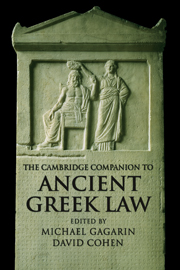4 - Early Greek Law
from Part 1: - Law in Greece
Published online by Cambridge University Press: 28 August 2006
Summary
If we take law to be a society's established means of settling disputes among its members peacefully, then law exists to some degree in most communities, and early Greece is no exception. Well-established procedures for dispute settlement are evident in our earliest literary texts, the poems of Homer and Hesiod, which were probably put in writing around 700 B.C.E., and several other works composed during the next two centuries support the epic description of dispute settlement. In addition, the earliest surviving legal inscriptions - texts of laws inscribed mostly on stone - have been dated to ca. 650, a date that coincides roughly with the dates given by later Greek authors for the earliest Greek law-givers. By the fifth century individual Greek cities had well-established legal systems of their own, and from at least two of these, Athens and Gortyn (on the island of Crete), enough evidence survives from the fifth and fourth centuries that we can study them in some detail, but in this chapter I will confine myself to the period from 700 to ca. 450.
- Type
- Chapter
- Information
- The Cambridge Companion to Ancient Greek Law , pp. 82 - 94Publisher: Cambridge University PressPrint publication year: 2005
- 1
- Cited by

